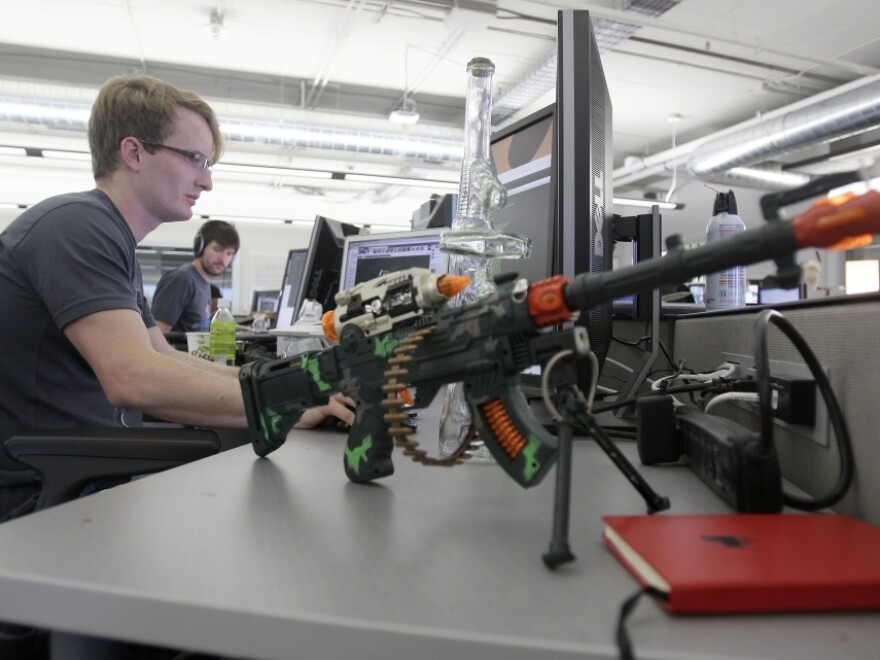Zynga is a company that makes money by selling nothing. Or, to be fair, by selling imaginary things, like tractors that plow farms on Facebook.
A "virtual good" is the term of art for an industry that minted $9 billion last year alone. Zynga is America's first virtual goods company to file an initial public offering. The IPO is expected to go through before Thanksgiving and will test whether the company's modern day alchemy — turning virtual goods into real money — is a game-changer for the gaming industry.
Misiek Piskorski is a professor at Harvard Business School. His job: to play and study popular online games like Cityville by Zynga.
"I forgot to come back to my city, so some of my plants have withered away," Piskorski explains as he plays the game on Facebook. "My friends actually have been kind enough to come back and unwither some of my plants."
Piskorski harvests his virtual crop and sells to a local grocer. Not for cash — at least, not the green, folding type. His money, like his goods, is virtual.
But for 5 percent of Zynga's 200 million monthly users, that's not the case. They buy a special currency to get ahead in the game, without relying on friends for help.
Or, Piskorski explains, they use the virtual money to buy luxury condos, yachts — goods that don't have a use per se, but are "just really beautiful to look at."
Zynga raked in $1 billion this last year, in sales of virtual tractors that plow virtual farms, or avatars that embody gamers' Web personas.

Tierra Cates, 19, sells Zynga currency at a CVS in Washington, D.C. She points to a shelf lined with pre-paid cards for Starbucks, Loews theaters and other businesses. One card has a goofy duck waddling up a pasture. It's for Farmville, Zynga's original mega-hit.
"I've seen kids come in with their parents and cry for these cards," Cates says. "My dad does it, too. And I think it's like, ridiculous."
Traditional video games make you pay up front. Zynga inverted the model: play for free. And, once you're hooked, pay to get ahead.
Revenue from virtual goods has helped Zynga kick the addiction to ad revenue — the curse of online businesses. The ads it does feature enhance the game. American Express sponsors blue virtual windmills that help grow crops. Lady Gaga sexed up the scene by releasing her album Born This Way on Gagaville.
Zynga officials declined an interview because, they said, they're in a "quiet period" required by the Securities and Exchange Commission before the IPO.
Eric Ries, author of The New York Times bestseller The Lean Start Up, is a Zynga fan. To be more precise, he's a defender of virtual goods. For skeptics who think virtual goods aren't real, he has this retort: "I don't think that you're using the word 'real' correctly."
Fashionistas spend $2,000 on a Prada handbag. Gamers spend $20 on an imaginary tractor or avatar or sword. It's the same, Ries says, except "the virtual objects are all tied to the specific environment in which they were developed." A sword purchased in the game World of Warcraft can't be taken into the real world, or into other games.
Sam Hamadeh, CEO of PrivCo, sifts through the financial data of private corporations and isn't so sure that virtual goods sales are anything more than a fad. Yet he estimates Zynga is worth $5 billion. Others say $20 billion.

The value comes down to whether competitors — traditional gaming companies like Electronic Arts or Activision — buy into the business model, Hamadah says. "Will Disney start offering games with their characters, in the same model?"
Copyright 2020 NPR. To see more, visit https://www.npr.org. 9(MDAxNDQ2NDAxMDEyNzU2NzM2ODA3ZGI1ZA001))




